Are you prepared for flood season in Florida?
If not, you could be putting your home and family at risk. After all, floods can cause significant damage to homes, so it’s important to take steps to prepare your home in advance. Fortunately, this article can help.
Here are ten tips for preparing your home for flooding, including buying flood insurance so that your property will be covered when disaster strikes.
- Know Your Flood Risk
Determine the flood risk for your area and understand the type of floods that are most likely to occur. Keep in mind that it’s always better to be an informed homeowner than to ignore the weather patterns in your community.
A little knowledge and curiosity can go a long way.
- Elevate Important Systems
Consider elevating electrical and plumbing systems, as well as appliances, to reduce the risk of flood damage.
The best strategy is to keep an eye on the forecast, so that you know what’s coming, if you live in an area that typically experiences heavy rains during flood season in Florida. Be sure to safeguard outlets, unplug small appliances and power strips, elevate major appliances like refrigerators, the washer and dryer, and reinforce pipes to help prevent breakage.
Never forget that electrical and plumbing systems can create extremely dangerous environments when exposed to rising flood waters.
- Install Check Valves
When heavy rains create flooding, there’s always a potential for sewage to leak into your home, thus creating a toxic situation for your family and pets.
That’s why you should install check valves in your sewer traps. Doing so will help prevent flood water from backing up into your living space. This is a minor investment that can help keep everyone in your home safe during and after severe weather.
- Seal Foundations and Walls
The basement of your home is especially vulnerable during flood season in Florida. After all, as flood waters rise, they will make contact with your basement and foundation walls before seeping into any other part of the house. Fortunately, you can take steps to reduce the amount of potential damage to these walls.
Seal all foundation and basement walls to prevent water from seeping in. This will help keep water out, thus reducing damage to the walls and personal property stored in the basement.
- Move Important Items
If you’ve never experienced flooding, you might be very surprised by how quickly it takes over your home and damages your property. This is especially true when it comes to your expensive furniture.
The best strategy is to move important items, such as furniture and valuables, to higher levels in your home to reduce the risk of flood damage.
- Install Flood Alarms
You never know when flooding will start. In fact, it could happen in the middle of the night while your entire family is asleep.
Installing flood alarms in your home will alert you about any water levels rising at any time during the day or night so that everyone can get to safety as quickly as possible.
- Maintain Good Drainage
Ensure that your property has good drainage, and that downspouts and gutters are functioning properly. This will help to prevent water from pooling around your home and leaking through the walls.
The best strategy is to get in the habit of regularly cleaning leaves and other types of debris from your gutters.
- Have a Backup Power Source
During severe storms, many homes lose power. This loss of power could last for a few minutes, hours, or days. When this is the case, you don’t want to be left in the dark until power can be restored.
The best way to make the most of this type of unfortunate scenario is to invest in a backup power source, such as a generator, to ensure you have power during a flood. This will enable you to have lights, be able to cook, and stay warm.
- Protect Windows and Doors
Flood waters are surprisingly strong, which means they can cause damage very quickly.
This is why every homeowner in flood areas should install flood barriers, such as sandbags, or plastic sheeting around windows and doors, to prevent water from entering your home. Even if these types of barriers aren’t able to completely hold out the water, they can significantly reduce the high cost of repairing flood damage.
- Purchase Flood Insurance
Many homeowners make the mistake of assuming that their homeowner’s insurance policy covers flood damage. This typically isn’t the case. In fact, most flood insurance policies are sold separately.
Take a look at your homeowner’s policy and study exactly the coverage it contains. Then find a flood insurance provider who will work with you to find the perfect coverage for your home. This is the best way to protect your home and personal belongings from flood damage.
A Guide to the Importance of Flood Insurance
It’s no secret that stormy weather is scary and experiencing water damage during flood season can be expensive to repair. Fortunately, by taking steps to prepare your home in advance, you can reduce the risk of damage from flooding and help ensure the safety of your family and property.
Please contact us today to schedule an appointment with one of our flood insurance specialists.
LEGAL DISCLAIMER
Views expressed here do not constitute legal advice. The information contained herein is for general guidance of matter only and not for the purpose of providing legal advice. Discussion of insurance policy language is descriptive only. Every policy has different policy language. Coverage afforded under any insurance policy issued is subject to individual policy terms and conditions. Please refer to your policy for the actual language.




